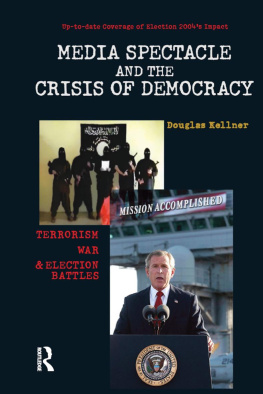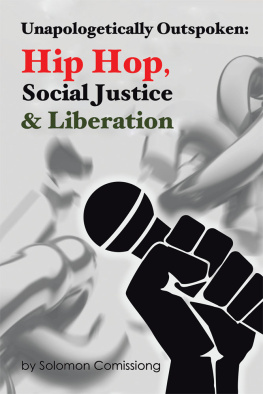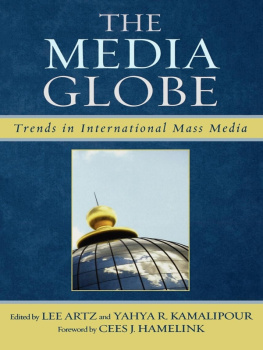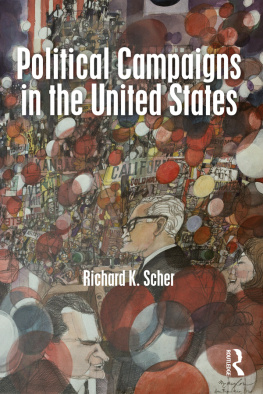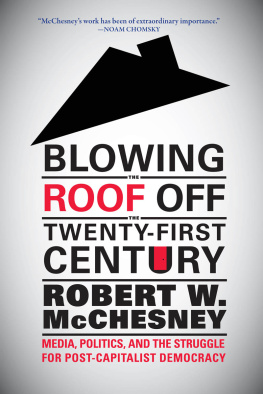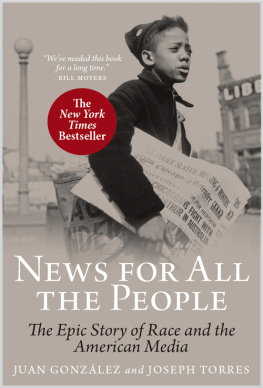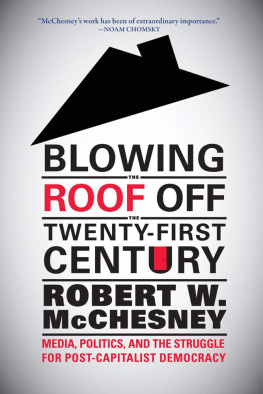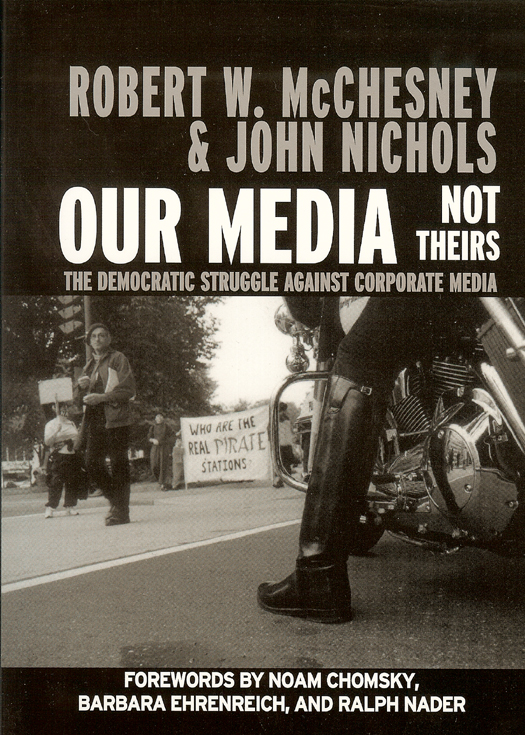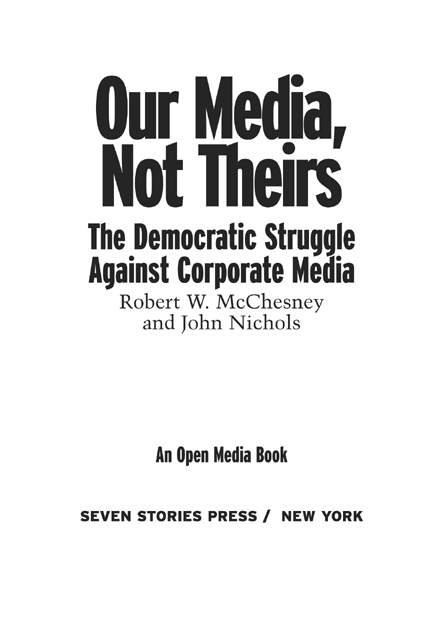Copyright 2002 by Robert W. McChesney and John Nichols
Forewords: 2002 by Noam Chomsky; 2000 by Barbara
Ehrenreich; 2000 by Ralph Nader
Series Editor: Greg Ruggiero
Sections of this book originally appeared in Nichols and McChesneys Its the Media, Stupid (Open Media/Seven Stories Press, 2000).
All rights reserved. No part of this book may be reproduced, stored in a retrieval system, or transmitted in any form, by any means, including mechanical, electric, photocopying, recording or otherwise, without the prior written permission of the publisher.
eISBN: 978-1-60980-282-0
Cover design and photograph: Greg Ruggiero
Cover photo: Washington, D.C., police descend on microradio activists as they prepare to march to FCC and NAB headquarters to demand increased community access to the airwaves. Washington, D.C., Dupont Circle, October 5, 1998.
College professors may order examination copies of Seven Stories Press titles free for a six-month trial period. To order, visit www.sevenstories.com/textbook, or fax on school letterhead to (212) 226-1411.
v3.1
EDITORS NOTE
Our Media Not Theirs is a fully revised and updated version of Robert McChesney and John Nichols book, Its the Media, Stupid (Seven Stories Press, 2000). Some sections of the text, including Ralph Naders and Barbara Ehrenreichs forewords, appeared in the original 2000 edition. Most of the text, however, including Noam Chomskys foreword, is new material written during the summer of 2002
Greg Ruggiero
Contents
The World We Share
BY BARBARA EHRENREICH
WHATEVER CONCERNS MOTIVATE you as a citizeneducation, tax policy, health care, gay rights, campaign finance reformthere is no escaping the media. Run a candidate for office, and youll have to hope her message doesnt get lost when its squeezed into the increasingly microscopic sound-bites favored by TV news. Stage a protest demonstration, and you must worry about whether it will get any coverageor whether the coverage it gets will turn out to be so warped that youll wish the media hadnt covered it at all. Or maybe you just want to educate the public about an issue youre all fired up about. Where are you going to turn if not to the media? Theres just no other way to communicate with large numbers of other peopleto make a point, raise an issue, and begin to flex your muscles as a free citizen of a democratic nation.
The media are as inescapable and ubiquitous a presence in our lives as the environment. In fact, they are, to a large extent, the mental and cultural environment we inhabit every day, bringing us the first voices we hear in the morning, the opinions we absorb while driving, the stories and images that entertain us after work. Insofar as we are intelligent social beings, the media are the world we share.
But the media are more than just an environment or a kind of neutral space where ideas, images, and opinions compete for our attention. In the last few years, the media have become a contentious issue in their own right. Theres a groundswell of public concern about violence in the media, which may be useful for capturing the attention of channel-surfers, but almost certainly seems to have a morally desensitizing effect on the viewer. Theres a growing worry about the impact of relentless media-transmitted advertising, especially on children, but ultimately on all of us as the advertising slops over into the content of a program or an article. And we are just beginning to understand all the ways the news media, in particular, subtly shape public policy and debate: Sensationalized crime coverage, for example, lays the groundwork for grotesquely punitive criminal justice measures like three strikes and youre out. Grossly inadequate coverage of foreign news leaves us increasingly clueless in an era of globalization.
The problem has always been what to do about it. We can write cranky letters to the editor; we can turn off our TVs. But these are tiny gestures. How can we really affect something as pervasive and powerfulvast, and at the same time, intimateas the media environment we live in? Heres where Robert McChesney and John Nichols come in. What they show in Our Media Not Theirs is that control of the media is becoming a political issue in countries all over the worlda subject for debate and potentially for legislation. It can happen here too, if we are willing to take the next step beyond griping: We can build a grassroots movement to counter the sleaze, the distortions, and the mind-numbing materialism of our unaccountable and corporate-dominated media.
Imagine the kind of media that a democratic society deserves: Media that bring us a wealth of diverse opinions and entertainment options; media that are held responsible for providing us with the information we need to function as informed citizens; media where ideas flow in both directions, and where ordinary people routinely have a chance to voice their concerns. If you like that picture, put yourself into it today by joining the struggle for media reform. McChesney and Nichols have shown us what is possible; now it falls to all of us to realize that potential with our activism.
In an Honest Debate
BY RALPH NADER
NOT TOO LONG ago, I opened a press conference in Salt Lake City by looking into the television cameras and talking about the fact that the people, not the multinational communications corporations, own the airwaves.
Thats one way to make media an issue. Butas Bob McChesney and John Nichols point out, its not the only way. In countries around the world, trade unionists, indigenous people, political activists, and ordinary citizens have put media on the agenda. Now, argue McChesney and Nichols, we the people of the United States need to make media a part of the national debate in the land where the founders guaranteed freedom of the press because they knew democracy required rich and diverse sources of information and ideas.
McChesney and Nichols are right.
We all need to start talking about the fact that the people of the United States own the broadcast airwaves; theyre the landlords. The radio and the television stations are the tenants. The corporations that own those stations should be paying the Federal Communication Commission (FCC) for the airwaves and some of that money should be recycled into developing television for the people. The rent money should be paying for audience-run networks that serve the people, that serve democracy, that treat serious matters in engrossing ways.
We all need to start talking about the fact that multinational corporations should not be allowed to dictate to the government the limits that will be placed on competition in the broadcast and print media sectors. We all need to start talking about the power that the people have to use existing antitrust and broadcast regulationsas well as new laws and new technologiesto break up monopolies and open up a true, wide-ranging democratic dialogue in this country.
There are corporate supremacists who say that issues of media ownership and content are too complex, too abstract to be issues for political debate. But the big corporatists, and those who make apologies for them, are not talking to the people.
When I bring up media issues with citizens in Salt Lake City and Atlanta, Detroit and Nashville, Los Angeles and Denver, I always find that the people get it. They get it 100 percent.


